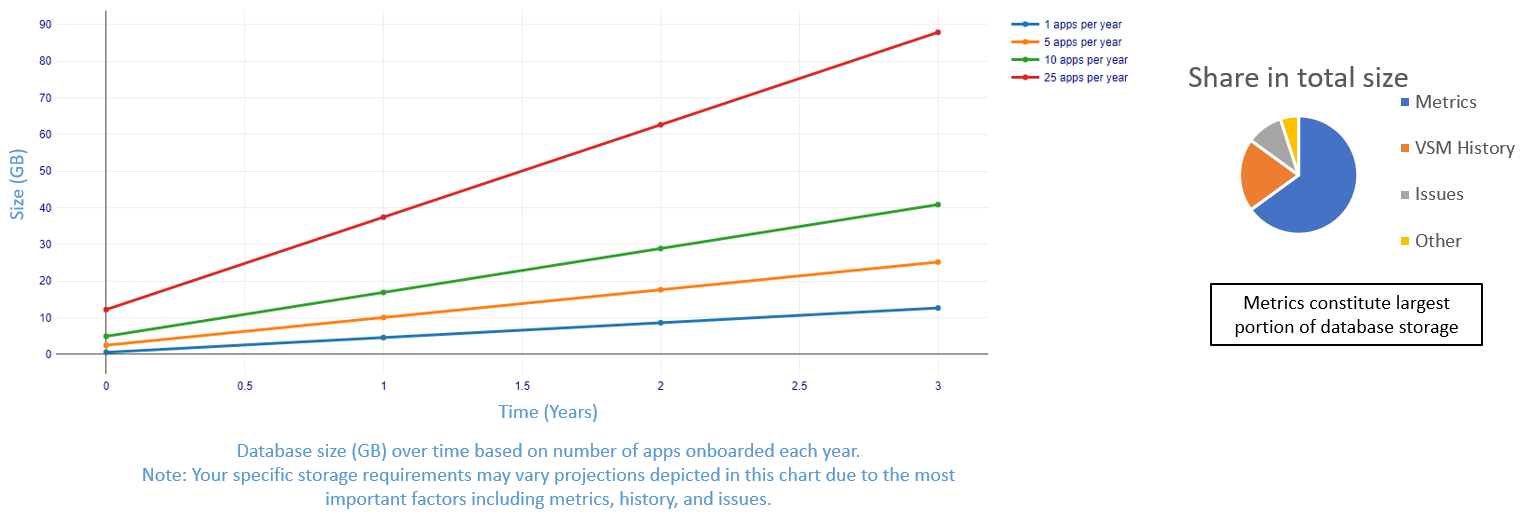System requirements#
Minimum system requirements for proof of concept environment#
| Platform | Docker and Docker Compose |
| Number of Platform Nodes | N/A |
| Operating System | See the Docker platform documentation for supported operating systems |
| Processor | 4 CPU Cores |
| Memory | 12 GBs RAM |
| Storage | 20 GBs for MongoDB with continued growth over extended usage (see figure below for storage guidelines), 3 GBs for Rabbit MQ and all HCL™ Accelerate Docker containers, 4 GBs during the installation process |
| Network | Gigabit (1000) Ethernet with low-latency to the database |
Minimum system requirements for production environment#
| Platform | Docker EE, OpenShift, Kubernetes |
| Number of Platform Nodes | 3 |
| Operating System | See your Docker platform documentation for supported operating systems |
| Processor | 4 CPU Cores |
| Memory | 12 GBs of RAM |
| Storage | 20 GBs for MongoDB with continued growth over extended usage (see figure below for storage guidelines), 3 GBs for RabbitMQ and all HCL Accelerate Docker containers, 4 GBs during the installation process |
| Network | Gigabit (1000) Ethernet with low-latency to the database |
MongoDB requirements
Unlike Docker Compose, the MongoDB is not installed by default and you are expected to install it separately, configure, and maintain the database. As a guideline, use the following specifications:
- 2 CPU Cores
- 8 GBs RAM minimum (16 GBs recommended)
- 20 GBs storage minimum (50 GBs recommended)
Note: MongoDB replica sets are supported if configured by the customer. Additional details are found here.
The figure below provides storage guidelines over time and contributors to total size.

For the above graph, estimates are calculated using real production data and with the following assumptions:
- Each onboarded application has at least one associated value stream.
- Over 300 issues are created and imported per year with associated Pull requests (PRs) and commits.
- Over 20 builds and deployments are captured per application per day.
- Five quality metrics are captured per build with examples including functional test results, code coverage, vulnerability scans, and so forth.
The following table details growth estimates over time based on number of apps per year.
| Number of apps per year | Day 1 (GB) | Year 1 (GB) | Year 2 (GB) | Year 3 (GB) |
|---|---|---|---|---|
| 1 | 0.5 | 4 | 8 | 13 |
| 5 | 2 | 10 | 17 | 25 |
| 10 | 5 | 16 | 28 | 41 |
| 25 | 12 | 37 | 62 | 88 |
The following table details estimates for environments based on number of apps.
| Environment | Number of apps | Size (GB) |
|---|---|---|
| POC | 1-3 | 20 |
| Pilot | 5-10 | 30 |
| Typical onboarding | 20-30 | 70 |
Containers#
| Name | Version | Environments | Future Releases |
|---|---|---|---|
| bitnami/nginx | 1.19 | Docker Compose, Docker EE, Kubernetes, OpenShift | Including all fix packs |
| bitnami/rabbitmq | 3.7.9 | Docker Compose, Docker EE, Kubernetes, OpenShift |
Note: All containers are included in the product. No specific setup required for containers.
Databases#
| Name | Version | Environments | Future Releases |
|---|---|---|---|
| MongoDB Enterprise Edition | 4.0, 4.2 | Docker Compose, Docker EE, Kubernetes, OpenShift | Including all fix packs |
Docker Platforms#
| Name | Version | Future Releases |
|---|---|---|
| Docker Enterprise Edition | 18.03 | Including all fix packs |
| OpenShift | 4.8 | Including all fix packs |
| Kubernetes | 1.21 | Including all fix packs |
Supporting Docker tools#
| Name | Version | Future Release |
|---|---|---|
| Docker Community Edition (refer to Note 1) | 18.03 | Including all fix packs |
| Docker Compose (refer to Note 1) | 3 | Including all fix packs |
| Helm (refer to Note 2) | 3 | Including all future versions, releases, and fix packs |
Note:
- These tools can run HCL Accelerate without the use of a Docker platform. However, this approach is not supported in production environments.
- Required prerequisite for Kubernetes
Integration sources#
| Name | Version | Future Releases |
|---|---|---|
| Atlassian JIRA | 6.4 | Including all future versions, releases, and fix packs |
| HCL™ Launch | 7.1.0.0 | Including all future versions, releases, and fix packs |
| UrbanCode Deploy | 7.0.0.0 | Including all future versions, releases, and fix packs |
| Jenkins | 2.7.1 | Including all future versions, releases, and fix packs |
| ServiceNow | Helsinki | Including all future versions, releases, and fix packs |
Note: New integrations are added frequently. Consult the HCL Accelerate plug-in website for the latest details.
Web browsers#
| Name | Version | Future Releases |
|---|---|---|
| Google Chrome | Latest version | Including all future versions, releases, and fix packs |
| Microsoft Edge | Latest version | Including all future versions, releases, and fix packs |
| Mozilla Firefox | Latest version | Including all future versions, releases, and fix packs |
Parent topic: Welcome